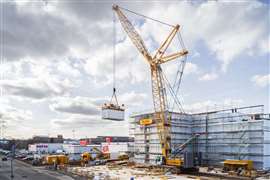Read this article in Français Deutsch Italiano Português Español
Permitting is a matter of when time is money
13 March 2025
Permitting delays can cause a chain reaction of higher costs.
We’ve all heard the expression “time is money.’” In the transportation industry, it’s often said, “Sitting trucks don’t make money.” As a permit service provider, I like to say, “Slow permits = no permits.”
 When it comes to specialized hauling, even the best and most detailed plans can get thwarted. PHOTO: Reinsfelder Inc.
When it comes to specialized hauling, even the best and most detailed plans can get thwarted. PHOTO: Reinsfelder Inc.
It’s easy to see the costs of delays – driver pay, escorts, fuel, sitting trucks, rigging crews and cranes all add up. Behind the scenes, office support like load coordinators and driver managers work hard to mitigate impacts. These costs can be compounded by weekend and holiday travel restrictions and are ultimately extended to those waiting for their shipment. Delays impact future moves resulting in fewer loads and less revenue at the end of the year. Many of these delays can be prevented by having an efficient permit procurement process.
We live in a world where we’ve grown to expect everything now. Online purchases that once took weeks are now expected the next day. We get frustrated if shipping takes more than 24 hours and we track orders using apps and websites that tell us how many stops our package is away. Soon, AI will likely anticipate our needs before we even place an order. Competition forces companies to innovate, setting high expectations for speed and efficiency.
Specialized transportation is no different. Motor carriers have streamlined their operations, making deliveries faster and safer, leading customers to expect quick and reliable service. Now loads are often booked at the last minute to the lowest bidder, so little lead time is given. Trucks are needing permits right away. Speed and efficiency in permitting has had to follow suit. States have responded by enabling faster turnaround times and streamlining rules and regulations, yet challenges remain for permit specialists to keep up.
Despite improvements, many obstacles slow down the permit process. Some of the most common delays include:
■ Improper credentials – Authorities must be properly set up whether private or for hire, intrastate or interstate. Vehicles must be properly registered with UCR and IRP at the correct weights. Insurance must have high enough coverage and be filed with the FMCSA as well as many jurisdictions that issue permits. Incorrect credentials stall the permit process.
■ Information errors – Garbage in = garbage out. Wrong truck/trailer/load information, incorrect axle data, dimensions or configurations can lead to permit rejections or incorrect permits and time-consuming corrections. Some permits can be amended, others must be reordered. No matter the reason, the issue creates a preventable delay, a potential citation, or worse, an accident if not caught in time.
■ Processing times – While many states offer automated systems and quick turnaround times, there are still states that require manual review. Many cities and counties require permits, but offer little automation and struggle to meet the needs of the industry. These processes cause delays particularly during peak times and when staffing is lean. We must also not forget that the application still has to get there and with multi-state movements, one must prioritize which applications to submit first.
 Taking proactive steps can ensure smooth permit procurement. PHOTO: Reinsfelder Inc. Inc.
Taking proactive steps can ensure smooth permit procurement. PHOTO: Reinsfelder Inc. Inc.
Specialized hauling is not safe from Murphy’s Law. “What can go wrong, will go wrong.” Breakdowns, weather, unexpected road restrictions, construction and the like can throw a wrench in the best plans. That said, preparation can prevent many delays and free up time for permitting specialists to improvise, adapt, and overcome the issues they can’t prevent. If it wasn’t challenging it wouldn’t be specialized and everyone would be doing it. Permit specialists and carriers can take proactive steps to ensure smoother procurement by:
■ Know standard turnaround times – Understanding which states process permits quickly and which may take longer helps with estimating costs, planning and setting realistic expectations.
■ Ensure accurate paperwork and information – Double check load details before submitting applications. Keep up to date equipment lists accessible to all employees.
■ Stay informed on regulations – State regulations change frequently, and being up to date can prevent costly mistakes.
■ Get assistance – It’s difficult for one person to know the nuances of permitting in all jurisdictions and be able to procure permits in a timely fashion. Utilize resources like permit guides or permit services to prevent surprises. Some services may offer additional tools to manage workflows, track applications and get the information that you need when you need it.
The demand for fast oversize permits will continue to grow as shippers look for just in time deliveries and to save on shipping costs. Time is money, and in oversize transportation, every minute counts. Motor carriers that prioritize efficiency and precision in their permitting process will be best positioned to succeed.
ABOUT THE AUTHOR
Scott Boehm is president of West Chester Permit. He has a passion for helping carriers navigate the complexities of oversize and overweight permitting. Under his leadership, West Chester Permit has become a trusted partner for transportation professionals nationwide.
STAY CONNECTED


Receive the information you need when you need it through our world-leading magazines, newsletters and daily briefings.
CONNECT WITH THE TEAM











